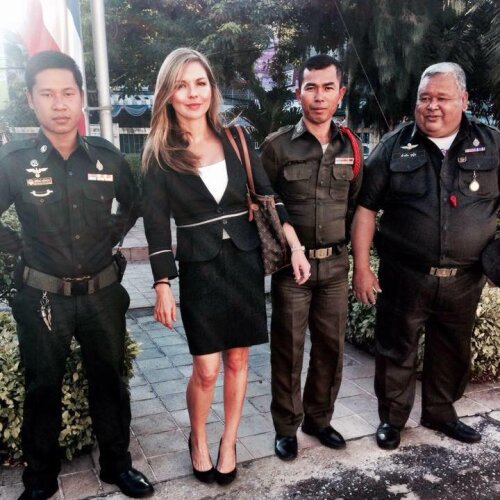Best Appeal Lawyers in Watthana
Share your needs with us, get contacted by law firms.
Free. Takes 2 min.
List of the best lawyers in Watthana, Thailand
About Appeal Law in Watthana, Thailand
Appeal law in Watthana, a bustling district of Bangkok, operates under the broader framework of Thailand's judicial system. An appeal is a legal process where an individual or entity seeks a formal review of a decision made by a lower court. In Watthana, as in the rest of Thailand, parties who are dissatisfied with a court's ruling can bring their case before a higher court. Appeals can pertain to civil, criminal, family, or administrative matters and are governed by criteria set out in the Thai Criminal Procedure Code and Civil Procedure Code. It is crucial to be aware that the appeal must be grounded in legal or procedural errors, or significant questions of law, rather than simply disagreement with the verdict.
Why You May Need a Lawyer
Navigating the appeal process in Thailand’s complex legal environment can be challenging, especially for those unfamiliar with the local language, culture, and legal procedures. Common situations requiring legal help include:
- Receiving an unfavorable verdict in a civil or criminal case
- Believing there was a procedural error during trial that affected the outcome
- Discovery of new evidence that could significantly change the decision
- Misapplication or misinterpretation of the law in the lower court's decision
- Issues relating to the fairness of sentencing
- Disputes in family law or business contracts where you seek reversal or amendment of a decision
Local Laws Overview
The appeal process in Watthana follows national Thai law but is also subject to local court procedures. Key aspects include:
- Time Limits: Appeals must typically be filed within 30 days of the judgment for most cases but may differ according to the type of case and court.
- Grounds for Appeal: Not all decisions can be appealed. Generally, appeals must be based on significant legal errors, new evidence, or misapplication of the law.
- Types of Courts: Appeals from the Court of First Instance go to the Court of Appeal or, in some cases, the Supreme Court. The appropriate appellate level depends on the subject matter and the value of the dispute.
- Documentary and Language Requirements: All submissions must be in Thai, requiring certified translations for foreign documents, and must conform to formal legal standards.
- Role of Legal Representation: While self-representation is permitted, legal proceedings are complex and often require expertise to navigate appellate court procedures effectively.
Frequently Asked Questions
What is an appeal?
An appeal is a request to a higher court to review and change the decision of a lower court. It is not a retrial but an examination of whether the legal procedures and interpretations were properly applied.
Who can file an appeal in Watthana?
Any party dissatisfied with a lower court's decision in a civil, criminal, family, or administrative case can generally file an appeal, provided the appeal is based on legal grounds and filed within the prescribed time limit.
How long do I have to file an appeal?
For most cases, an appeal must be filed within 30 days of the judgment date. However, some cases may have different deadlines, so it is crucial to consult with a lawyer to confirm specific timelines.
Do I need a lawyer to appeal?
Although it is legally possible to represent yourself in an appeal, hiring a lawyer is highly recommended due to the complexity of legal procedures and the need for technical legal arguments.
Can I present new evidence during an appeal?
Typically, appellate courts in Thailand only review the records and evidence presented in the lower court. However, in rare circumstances where new, significant evidence is discovered, it may be admissible with the court’s permission.
What types of decisions can be appealed?
Most final judgments and significant orders of lower courts can be appealed, though there are exceptions. Some interim orders or decisions from small claims courts may have limited appeal options.
How long does the appeal process take?
The duration of an appeal process varies depending on the complexity of the case, court backlog, and whether new evidence or detailed reviews are involved. It can range from several months to over a year.
What are the possible outcomes of an appeal?
The appellate court may affirm, reverse, or modify the lower court’s decision, or in rare cases, order a new trial. The specifics depend on the legal findings in the appeal.
How much does it cost to appeal?
Costs vary and can include court fees, legal representation fees, and translation or documentation charges. Discussing potential costs with your lawyer in advance is important.
Where is the appeal filed in Watthana?
Appeals are usually filed at the clerk's office of the court that issued the original judgment. The case is then transferred to the appropriate appellate court within Bangkok’s jurisdiction.
Additional Resources
If you are seeking further information or assistance, the following resources may be helpful:
- The Bangkok South and Central Criminal and Civil Courts
- The Thai Bar Association
- The Lawyers Council of Thailand
- Legal Aid Centers stationed in government offices
- Office of the Judiciary, Thailand
Next Steps
If you believe you have grounds for an appeal or have questions about the process in Watthana:
- Gather all relevant documentation, including court orders, trial transcripts, and supporting evidence
- Write down the reasons you believe the lower court’s decision was incorrect
- Consult with a qualified lawyer who specializes in appeals within Thailand’s legal system
- Ensure any potential appeal is started within the legal timeframe to avoid dismissal based on lateness
- Attend all appointments and follow your lawyer’s advice regarding document submissions and courtroom procedures
Lawzana helps you find the best lawyers and law firms in Watthana through a curated and pre-screened list of qualified legal professionals. Our platform offers rankings and detailed profiles of attorneys and law firms, allowing you to compare based on practice areas, including Appeal, experience, and client feedback.
Each profile includes a description of the firm's areas of practice, client reviews, team members and partners, year of establishment, spoken languages, office locations, contact information, social media presence, and any published articles or resources. Most firms on our platform speak English and are experienced in both local and international legal matters.
Get a quote from top-rated law firms in Watthana, Thailand — quickly, securely, and without unnecessary hassle.
Disclaimer:
The information provided on this page is for general informational purposes only and does not constitute legal advice. While we strive to ensure the accuracy and relevance of the content, legal information may change over time, and interpretations of the law can vary. You should always consult with a qualified legal professional for advice specific to your situation.
We disclaim all liability for actions taken or not taken based on the content of this page. If you believe any information is incorrect or outdated, please contact us, and we will review and update it where appropriate.















